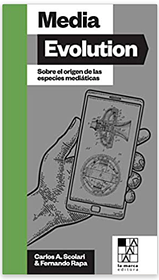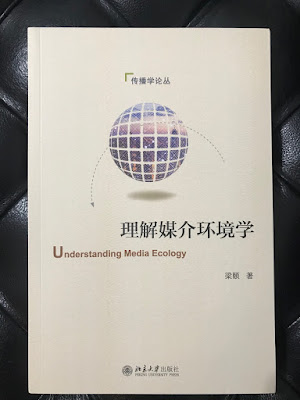Welcome to Light On Light Through, Episode 160, in which I review the just-concluded limited series on HBO, The Undoing.
reviewing Black Doves; Cross; Dark Matter; Dept. Q; Dexter: Resurrection; Dune: Prophecy; For All Mankind; Foundation; Hijack; MobLand; Outlander; Presumed Innocent; Prime Target; Severance; Silo; Slow Horses; Smoke; Star Trek: Strange New Worlds; Tehran;The: Day of the Jackal, Diplomat, Last of Us, Night Agent; Your Friends and Neighbors +books, films, music, podcasts, politics
George Santayana had irrational faith in reason - I have irrational faith in TV.
Monday, November 30, 2020
Sunday, November 29, 2020
The Undoing Finale: Hiding in Plain Sight
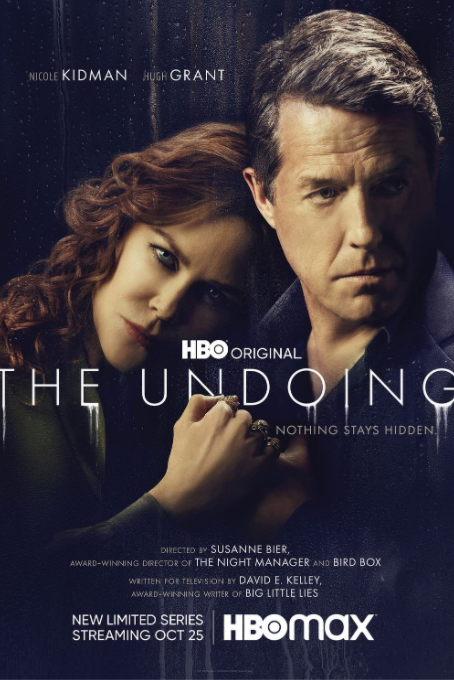
My wife thought it was Jonathan. She kept coming back to why did he leave town if he wasn't reeling from the killing. But I bought his argument that he was traumatized by coming back and finding the bludgeoned body. That was close to the truth. Jonathan did try to leave after smacking Elena against a wall. And Elena ran after him with the anvil, and Jonathan took it from her and killed her. So Jonathan's story was close to the truth, except he left out the all-important fact that he killed her.
Although this ending was somewhat surprising, since Jonathan was presented as the obvious suspect, wrongly accused, I have to say that hinging the surprise in a story on a murderer's convincing performance of innocence, in pretty much scene after scene, is not my favorite ending to a whodunnit. Maybe I don't get out enough in the world, but I find it a little hard to believe that Jonathan, any murderer, could have been so cool, upset, and convincing.
And one other nitpack: I thought that Haley, who had been shown as nothing but brilliant and tough up until that final court scene, got rolled over a little too easily. Wouldn't someone of her calibre had a least a few tricks up her sleeve when things started going so badly in the courtroom?
But all in all, a riveting little series, with tour de force performances by everyone, down to and especially in that last harrowing gambit on the road with father and son.
See also The Undoing 1.1: A Murder, A Missing Person, and NYC Bustling in the Snow ... The Undoing 1.2-3: A Dearth of Likely Suspects ... The Undoing 1.4: Three Great Scenes with Sutherland ... The Undoing 1.5: The Algorithm, the Waiter, and the ...
Saturday, November 28, 2020
The English Game: Upper Class, Working Class, Sports and Money
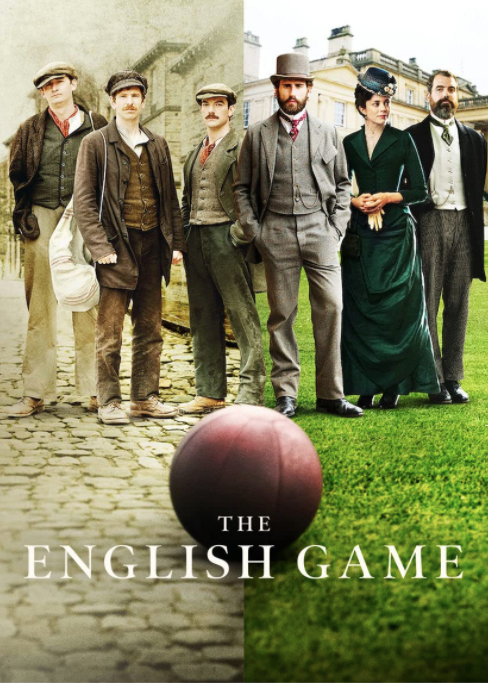
My wife and I binge-watched The English Game on Netflix. We're not football aka soccer (in the U.S.) fans. In fact, the only team we care about are the New York Yankees. But we really enjoyed The English Game. Although it's almost completely unlike Friday Night Lights, it's an another example of a sporting story done so well, and touching on so many social and interpersonal issues, that it's well worth watching even if professional sports are not high up on your entertainment list.
The English Game was written by Downton Abbey's Julian Fellowes. That's a reason right there that the show is irresistible. Fellowes has a keen eye for local historical color and speech, ranging from the wines and port that are poured at dinner tables to a smoking train with garrulous passengers wending its way through the countryside. And he's deft at handling the class conflicts which are the very lifeblood of Britain.
In the late 1870s and 1880s, these class conflicts shot through the emerging sport of football. The game was invented by the upper class, who devised the rules and played the game for the pure love of it. The workingmen, in the surge of the Industrial Revolution, also loved the game, and brought to it some new strategies from Scotland, in the person of Fergus Suter, a real football player in our real history, who plays a major role in the series. His opposite is Arthur Kinnaird, also a real person, whose father was a lord. But he has something in common with Fergus in their shared devotion to the game, and maybe in their ultimate response to the most unsettling element in this new iconic culture: those who would play the game for not just love but money.
I didn't know most of the acting talent in The English Game, but they all did a fine job. I did know Charlotte Hope as Catherine in The Spanish Princess, and believe it or not she plays a very similar role in The English Game, but I won't tell you exactly what or how it's resolved. I will tell you that The English Game is well worth your viewing, not just for the entertainment but the enduring social issues it adeptly addresses.
Thursday, November 26, 2020
Podcast: Tiger King: A McLuhanesque Perspective
Welcome to Light On Light Through, Episode 159, in which I offer a McLuhanesque perspective about Tiger King, Netflix's runaway smash docu-series.
Further reading: McLuhan in an Age of Social Media
Video with Jesse Ventura mentioned in the podcast
Tiger King: A McLuhanesque Perspective
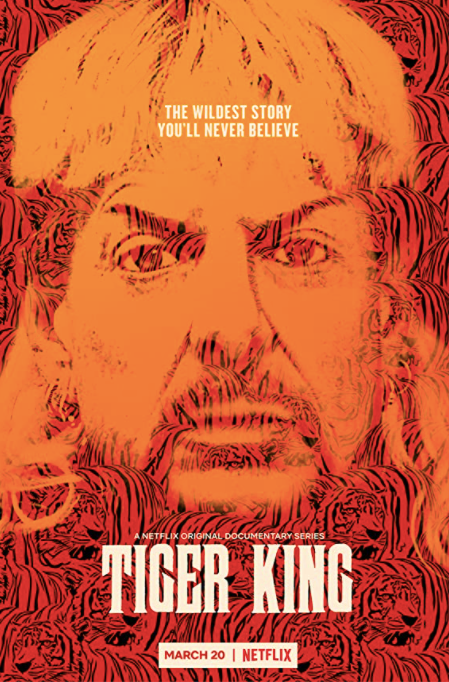
“The 'content' of a medium is like the juicy piece of meat carried by the burglar to distract the watchdog of the mind,” Marshall McLuhan famously declared in Understanding Media (1964, p. 32). The content of Tiger King, the runaway global hit documentary on Netflix, are the tigers and other animals in Joe Exotic's Oklahoma zoo, thrown pieces of meat, juicy and otherwise (some is expired meat from supermarkets). But the deeper story, underlying the meat, is Joe Exotic's unquenchable thirst for fame, relentlessly pursued through social media. And in the irony of ironies, he eventually obtained that fame, along with a prison sentence of 22 years for attempted homicide of an animal activist and mistreatment of animals.
My late editor at Tor Books, David Hartwell, once told me never to kill a pet cat or dog in my science fiction novels. "Some readers will never forgive you," he said. I didn't heed his advice in one of my novels, and its sales indeed were markedly off. I have no idea what Joe Exotic actually did and didn't do to his animals. I wasn't there. But I was impressed, near the end of the docu-series, to hear someone remark that mistreatment of animals, including killing tigers, was likely to be far more effective in turning the jury against him, then his planned murder of animal-rights activist Carole Baskin in Florida. One of his ultimately not-so-loyal staff, Kelci "Saff" Saffery, told Joel McHale in the postscript interview that the thing that got him the most angry at Joe was taking in an old horse from a grieving owner, and chopping it up for meat to feed the tigers after assuring the owner that he'd take good care of the horse.
The things he did to the animals apparently really happened, though we mostly only know this through the words of his staff. In contrast, the threats against Carole Baskin were not only later reported by his workers and associates, but conveyed to the world via videos that Joe relished making and posting, in which he shot and otherwise assaulted dummies of Baskin. Since his feud with Baskin fueled his pursuit of fame, he at very least had to have had some misgivings about getting her permanently out of the picture. He fancied himself a country singer and posted music videos, with someone else's voice overdubbed. He ran for President in 2016 and governor of Oklahoma in 2018 and, obviously, lost both times. If you think about wrestler Jesse Ventura's successful run for governor of Minnesota in 1999, Joe's run in Oklahoma wasn't so crazy. The only thing Ventura really had over Joe was more fame to begin with (in addition to Ventura being mayor of a medium-sized city in Minnesota, but without the pro-wrestling fame, that mayor position would likely not have been enough to propel Ventura into the governorship; here, by the way, is an interview Ventura did with me after he left the state house).
Joe Exotic, now in prison, has a lot more fame than Ventura had in 1999. Can someone in prison run for Governor? I don't know, that's up to state law. Let's say he's released? That depends, again, on the state law in Oklahoma. But there's nothing in the U. S. Constitution that would prevent him from running -- again -- for President.
Given what we've had in the White House the past four years, stay tuned. Fame is a fungible commodity that can easily be transferred from anything to politics. Nothing would surprise me.
Tuesday, November 24, 2020
Big Sky 1.2: The "Goods" and the Ruined Plan
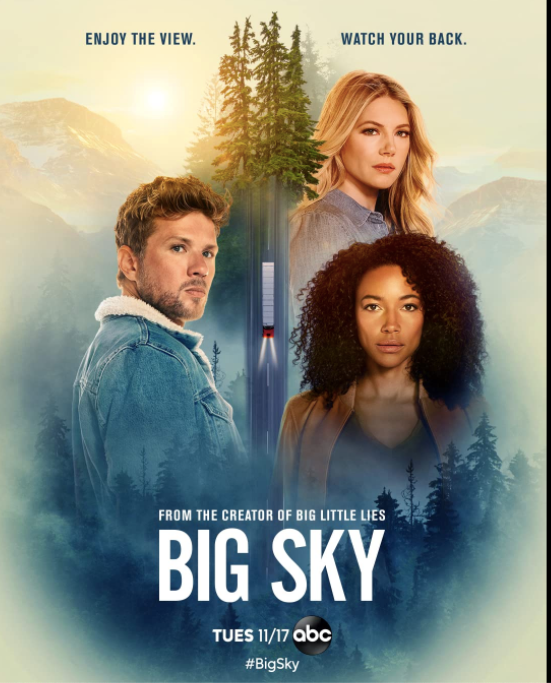
Three Beach Boys Covers: Foxes and Fossils, Hal Eisenberg, The Fendertones
I'm still in a musical frame of mind -- actually, I always am -- but this frame includes writing, so here's my third blog post in two days about exceptional music, in this case, three excellent Beach Boy covers that I've been really enjoying on YouTube.
The first is "Don't Worry Baby" by the cleverly named Foxes and Fossils. That would be three women who look and sing great, and a number of guys who sing and play, and bill themselves as old, though some are probably younger than I am (I usually feel like I'm 17, unless it's a bad day, and it's more like 19). I love the velvety harmony and the whole general feel of this video.
Next is "I Can Hear Music," which I just came across the other day, by Hal Eisenberg with "friends and family" in Nashville. This is not a typical Beach Boys song -- it was written by Jeff Barry, Ellie Greenwich and Phil Spector (Ellie Greenwich, by the way, produced my group The Other Voices aka The New Outlook for Atlantic Records in 1968) not Brian Wilson, who didn't even sing on the Beach Boys 1969 recording (Carl sang lead, and produced the record). That makes it a tough song to cover really well. Hal Eisenberg's is the best I've come across -- I like it even better than Kathy Trocolli's 1996 version with some of the original Beach Boys -- with Hal's evocative lead backed by sweet sweet harmonies.
And last but in no way least is the Fendertones' "Sloop John B". The Fendertones have done so many Beach Boy covers that they may add up to more songs than the Beach Boys actually recorded. And this one is a masterpiece, with Scott Totten and John Cowsill (who tour now with the Beach Boys and, yep, that's John Cowsill from the Cowsills) joining the Fendertones in a gracenote perfect rendition of Brian Wilson's stunning arrangement and recording, down to someone singing "I feel so break up" about a third-way into the song, when everyone else sings "broke up," just as The Beach Boys (probably accidentally) did in 1966.
I should mention how much I've always loved The Beach Boys. They usually are my second all-time favorite group -- the first are the Beatles, and once in a while The Rolling Stones are my second. The New Outlook sang "Surfer Girl" as one of our regular numbers, when we cut classes and sang in the early afternoon in The Alcove at City College up on 140th Street in Manhattan in the Fall of 1963. So I'm always looking for good covers, and Foxes and Fossils, Hal Eisenberg, and The Fendertones are among the very best.
Monday, November 23, 2020
Don Caron's "Fifty Ways to Leave the White House"
This seems to be my day to be writing about music. I just came across this yesterday, Don Caron's parody "Fifty Ways to Leave the White House". The lyrics are not only suitably barbed, but Caron's voice, his slightly annoyed, laconic, sarcastic delivery, does a fine and funny job of capturing Paul Simon (the Yiddish "farbissiner punim" captures that personna maybe a little better than the English adjectives). Enjoy!
Creds: Caron wrote and sings the song, for the Parody Project, executive producers Sally Headley, Jack Heighway and Jerry Pender.
Dylan's Murder Most Foul: From Then to Now
I didn't think about November 22, 1963 much yesterday, as I usually do on one of the worst anniversaries of my and maybe your lifetime, because I was busy with all kinds of other things, including doing a little virtual concert at Philcon (a science fiction convention) of songs from my new album, Welcome Up: Songs of Space and Time, my first new album in almost 50 years.
But I was on my son Simon's Tumblr page today, scrolling back through his posts, and came upon this one from back in March. The world has been so crazy since then and now, with Covid and the election, and I've been so immersed teaching online classes, writing, doing podcasts, and the like, that I didn't get a chance to listen to Dylan's "Murder Most Foul" until today.
It's the best Dylan lyric -- as in emotive power, tear up the street and rip up your soul, but maybe you can put it back together -- since, I don't know, "Hurricane"? -- and, no, actually, "Murder Most Foul" is a lot more than that. Because of its subject. The story of our lives, or everyone's who was alive and cognizant in 1963 and all these years since. The song is almost a couplet with Dylan's 2012 Roll On John, about another unfathomably unacceptable assassination, but a much shorter song, and almost a warm-up for "Murder Most Foul," which joins Phil Ochs' masterwork, The Crucifixion, as an extraordinarily insightful song about the event which in a single moment changed the course of history, inextricably and unalterably, for the worst. But "The Crucifixion" was at the moment, written back then. And "Murder Most Foul" is about then, and now, and all time time in between. About the end of the joy and innocence and optimism for the future that surged through the early 1960s, an extinction that the world has manifestly still not recovered from.
I know I haven't. I think about it often. Even write about it in my science fiction. It's reassuring that Dylan hasn't either. "Murder Most Foul" captures all of this and more with a lyric which, if you want to know where I'd place it, it would be among the best lyrics Dylan, the greatest lyricist of the 20th century, ever wrote. Plays upon words about playing songs and playing parts. I may teach a course about this song someday. It even has a recondite reference to Daniel Keyes' "Flowers for Algernon," one of my all-time favorite science fiction stories. But the killing of John F. Kennedy was too terrible to be fiction. And Dylan caught it all. In a gruff, plaintiff voice that floats halfway between speech and song, over a piano played by Fiona Apple that will pierce your heart. And here in the 21st century, with a fifth of it almost gone, this song could well be one of the greatest of this century, too.
On a lesser but still significant note -- at least to me -- Dylan's song also scratches an itch I have had about songs about DJs that also goes back to the 1960s. I even wrote a short story about that -- Sam's Requests -- and just a month or two ago created a Spotify songs-about-DJs playlist with that theme. Dylan's song eminently belongs there, containing a series of requests, that in some arcane, nearly endearingly inscrutable way reflect Dylan's commentary on the times, to Wolfman Jack, whom I actually worked with. I just added Dylan's song to the playlist. Yeah it belongs there, and in a permanent place in the thoughts of those of us who lived through that era-shattering day.
No, we never made it to the New Frontier, but we'll never stop trying.
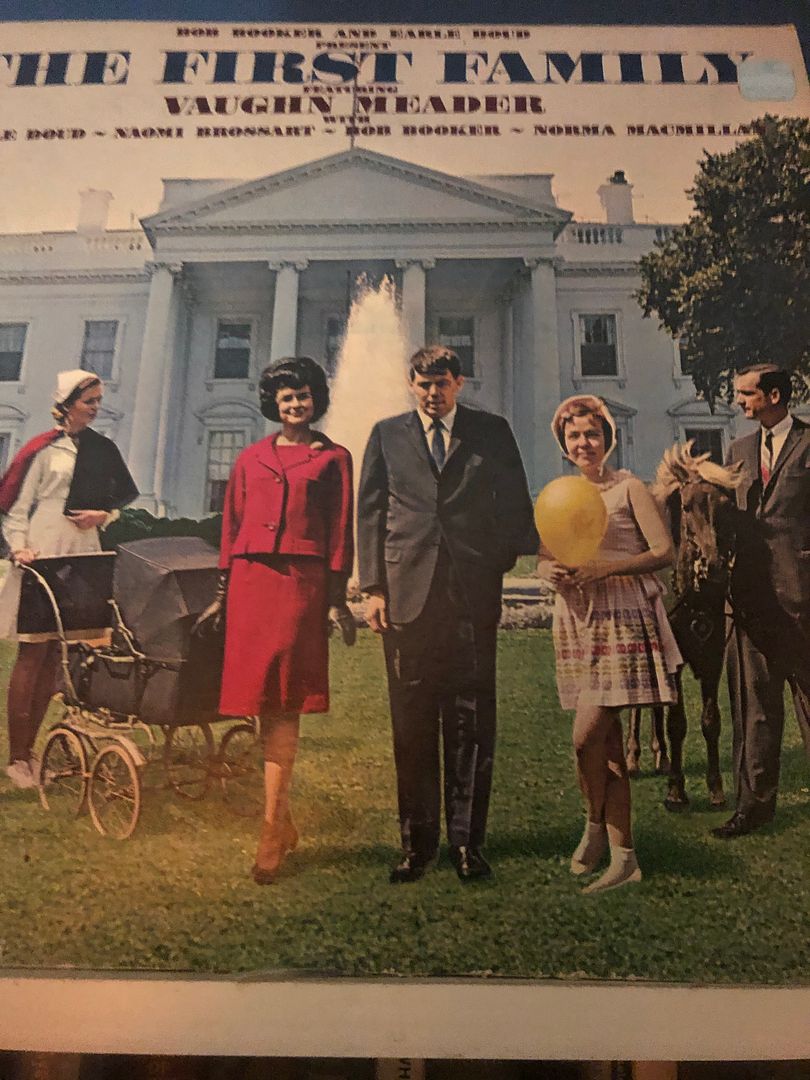
a happier time
Further reading:
- Here are the lyrics -- or here with the song -- more insights than you'll find in a dozen of the best books on the subject
- ‘Murder Most Foul’ Is the Bob Dylan Song We Need Right Now Simon Vozick-Levinson, Rolling Stone, March 27, 2020

Sunday, November 22, 2020
The Undoing 1.5: The Algorithm, the Waiter, and the ...

Well, those two elements -- the algorithm and the waiter - were by no means the most important features of The Undoing 1.5, just on HBO, but I didn't want to give away the main thing, actually two main things, in the title, and the algorithm and the waiter were nice touches. Finding that Jonathan's attorney uses Amazon-level algorithms to get the crucial characteristics of the jurors, that was cool. (And Haley's one outstanding lawyer, isn't she?) And the waiter constantly interrupting the meal that Jonathan, Grace, and Henry were trying to have in the restaurant -- that was a metaphor for this whole series, being interrupted by all kinds of things, so that after five episodes, we still can't be sure whodunnit.
And that restaurant scene did lead to the two biggest developments in this episode. First, Jonathan at age fourteen was responsible for his little four-year-old sister's death, because he didn't keep a watchful eye on her. Jonathan's mother says he never felt any guilt for that -- which leads Grace's friend Sylvia to tell her that means Jonathan's a sociopath. But Jonathan sure expressed some powerful guilt in the restaurant to Grace about his sister's death, to the point that she comforted him.
But before the hour was out, Grace discovered another suspect. Henry. That hammer or anvil or whatever exactly that was could, I suppose, have been wielded by Henry to bludgeon Elena. We earlier learned that Henry knew about Jonathan and Elena - he saw the way they were relating to each other in front of the school -- so there's your motive, right? I suppose Haley would be happy to have another suspect to throw at the jury, but Grace is horrified. And you know what? I still think it's not Henry, either. A little too soon, for one, with another episode (the finale) next week. And, what kind of psycho would Henry have to be to be so relatively calm after commiting for such a brutal murder?
So ... we'll find out next week (though my wife says all we may see is Jonathan acquitted, and never know who did it). But I'm thinking we will find out and ... the killer was Elena's husband Fernando.
See also The Undoing 1.1: A Murder, A Missing Person, and NYC Bustling in the Snow ... The Undoing 1.2-3: A Dearth of Likely Suspects ... The Undoing 1.4: Three Great Scenes with Sutherland
Why Did the Polls Get So Much Wrong Again in 2020 US Election?
Welcome to Light On Light Through, Episode 158, in which I discuss why the polls got so much wrong, again, in the 2020 US Presidential election. They did predict that Biden would win, which he did, but by smaller margins in several states than projected in the polls. And he lost Florida and Ohio, which the polls said he would win. Why did this happen, again (it happened in 2016), what can be done about it, and what are the implications of this failure in polling for the future?
Friday, November 20, 2020
Big Sky 1.1: Pretty Big Deal

My wife and I caught David Kelley's Big Sky. He has a good thing currently going on The Undoing, check out my reviews. Big Sky, based on the pilot, appears to be another good thing. [Spoilers below.]
The story takes place in Montana, hence Big Sky. It has a definite Twin Peaks vibe, replete with a scene in a diner (which shut down, due to Covid, a real Twin Peaks touch right there). But so far, there's nothing other-worldly or interdimensional. (I can't recall, was Twin Peaks already in that alternate zone in its first episode?)
But what we do have is a sharp kidnap-sex-slave ring that's been going on for a while, with at least two out-of-the-blue surprises. A truck-driver who seems an easy going guy (played by Brian Geraghty, who made a good impression on Chicago P. D.) tazes a prostitute (played by non-binary Jesse James Keitel) he picks up at a truck stop, and then two young women whose car broke down on the road in the woods. And a state trooper (played by John Carroll Lynch, who has made a good impression on dozens of shows) plays a state trooper, who kills a private detective who is looking for the missing women. One unexpected tazing (the other two were certain to happen as soon as the car broke down on the road) and one unexpected murder are a better-than-average quotient of surprises in a pilot, which usually have only one.
And it's a good thing that the victims were just kidnapped not killed. They look to be at least a little more interesting-than-usual characters (played by Natalie Alyn Lind and Jade Pettyjohn, in addition to Keitel). And the murder of the detective leaves the agency in the hands of two women investigators, played by Kylie Bunbury and Katheryn Winnick. I haven't seen Bunbury before but Winnick was memorable in Bones and even more so in Vikings.
So it looks like we have some good ingredients in Big Sky, and I haven't even mentioned the music, also much better than average. Hey, it's not too often, if at all, that you hear The Rolling Stones' "It's All Over Now" on a network television show. See you back here next week,
Thursday, November 19, 2020
Podcast Review of The Crown season 4
Welcome to Light On Light Through, Episode 157, in which I review The Crown season 4 -- the best season so far in this superb series.
Further listening:
Review of The Crown seasons 1-3
Further reading:
Review of The Crown Season 1 ... Season 2 ... Season 3 ... Season 4
The Crown season 4: Margaret Thatcher and The Queen, Charles and Diana
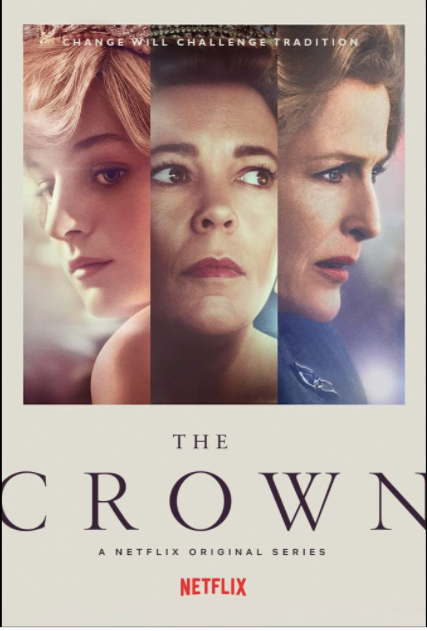
I thought Season 4 of The Crown, which my wife and I just finished binge watching, was the best of the series so far. It had two toweringly important stories, each brilliantly acted and powerfully presented.
Margaret Thatcher, the U.K.'s Iron Lady, contemporary of Ronald Reagan (from my American perspective), was tour-de-force portrayed by Gillian Anderson. Her acting, excellent to begin with in The X-Files, just gets better and better. Her conversations with Olivia Coleman as Queen Elizabeth II were non-pareil. Woman-to-woman, perfect tones of voice and gestures and head inclinations and facial expressions, these conversations are a veritable textbook of how to act. And the true story of Thatcher, the combination of her real toughness and real vulnerabilities, including her clinging love of power, rang bells as to what's happening in the United States right now. Trump has none of Thatcher's steel. His toughness is all bravado. But he has the same love of power. And though Thatcher believed in democracy, albeit as a hard-eyed conservative, and Trump is a fascist at heart, their penchant for clinging to power is disturbing to contemplate, and deftly portrayed by Anderson as Thatcher in The Crown.
Charles and Diana, as we all know, is a modern-day Shakespearean tragedy. Josh O'Connor has Charles, at least far as we saw him in the news clips, pretty well down pat. The slightly bent head, the almost diffident smile, all of that hiding a keen wit and a boiling well of anger at being stuck in this marriage and even life makes a riveting counterpoint to Emma Corrin's Diana, innocent at first, growing into a thirst for fame, soaking it up, and the beginning of a real humanitarian soul that leads her to hug a boy with AIDS in Harlem, NY. The two of them drive themselves and hence the larger family to the breaking point.
But the Queen survives it all, and succeeds, better politically than personally, but still tolerably well at this point, as the family celebrates an internally frosty Christmas in the closing scene. I have no idea how accurate this all is. I of course know nothing of Elizabeth personally, and I prefer ancient Roman history to England for the past seventy years. But, as I always tell my students, docu-dramas never tell the complete truth, not usually even most of it, and that's ok. Because, at their best, they can tell deeper truths about human affairs, in all senses of that word. And this season of The Crown does one fabulous job of it.
See also The Crown season 1: Peerless ... The Crown season 2: Standing Ovation ... The Crown season 3: Outstanding Story, Worthy Chapters
Tuesday, November 17, 2020
Joel Iskowitz at the Atlantic Gallery
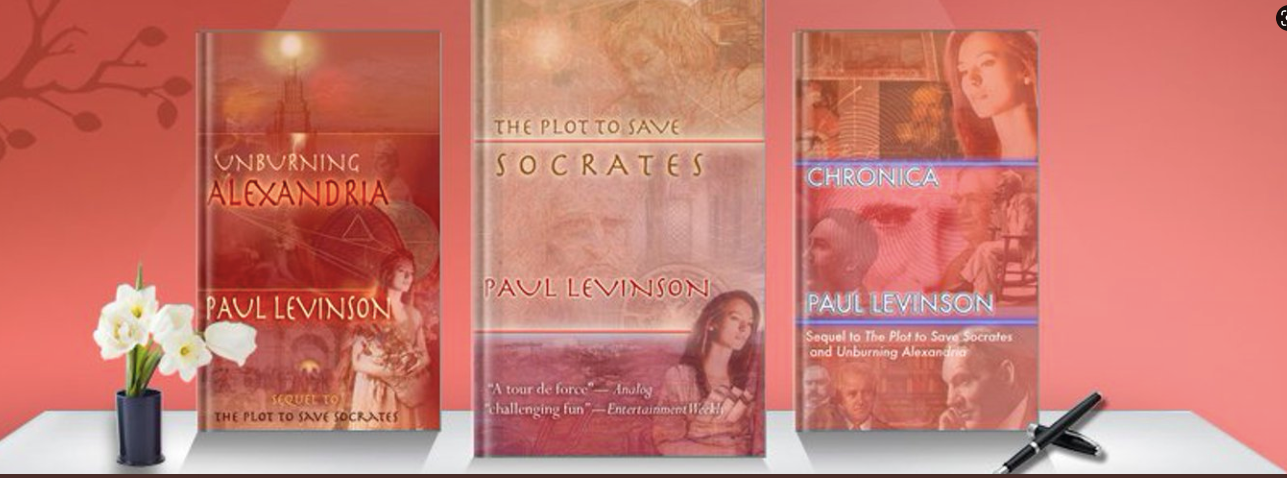
As many of you know, I've had the great fortune of having Joel Iskowitz design the covers for many of my books, ranging from the Sierra Waters time travel trilogy (pictured above -- and note that the third novel, Chronica, written in 2015, makes reference to Joe Biden as President!) to Marilyn and Monet (pictured at the end of this post). Isky, as I call him, has been my friend since the 5th grade in the Bronx, where we conspired about how to impress girls, and I first became aware of his talent for illustration. More recently, he has guest lectured in some of my classes at Fordham University, I interviewed him on my Light On Light Through podcast, and he introduced me to John Glenn (subject of several Iskowitz portraits), whom I interviewed just a year before his passing for Touching the Face of the Cosmos: On the Intersection of Space Travel and Religion (for which Isky also did the cover) (here's an audio of the interview).
So, I was truly delighted to learn about Joel Iskowitz's first solo show, Icons of Inspiration, at the Atlantic Gallery in New York City. Our continuing caution about COVID kept Tina and me from attending in person, but, happily, you can see all of Isky's works online at the virtual show, right over here.
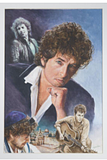
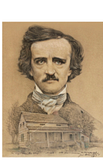
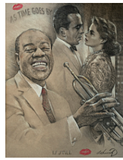
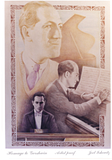
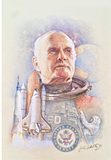 My favorites are just about all of them, but here are some that really hit the spot for me: Bob Dylan, Edgar Allan Poe, Louis Armstrong (with Bogey and Bacall), George Gershwin, and of course John Glenn.
My favorites are just about all of them, but here are some that really hit the spot for me: Bob Dylan, Edgar Allan Poe, Louis Armstrong (with Bogey and Bacall), George Gershwin, and of course John Glenn.
Prints are available of many of these -- they'd light up any wall, just as they light up the soul.
Sunday, November 15, 2020
The Undoing 1.4: Three Great Scenes with Sutherland

Well, The Undoing checked in with another great episode -- 1.4 -- on HBO tonight. And we still have really no better idea of who killed Elena.
I mean, the end, and this is not much of a spoiler, points a little more to Grace, assuming that's who Jonathan meant went he told Connie Chung that he had lost someone he loved. There's maybe a chance that he meant losing Grace, but if not, if that meant he deeply loved Elena, and he lost her, when Grace killed her ... well, that still doesn't mean that she did. Didn't the police cam show her walking away from the murder scene, before Elena was killed?
So that still leaves us with a paucity of plausible suspects. I still think there's an outside chance that Donald Sutherland's character Franklin -- Grace's father -- did it. He has a pent up fury inside him, and Sutherland played him powerfully tonight, in more than one scene. I think my favorite was his conversation with Jonathan. In addition to Franklin's words, he looked like he was close to spitting in his errant son-in-law's face. A close second was Franklin confessing to Grace how unfaithful he had been to his wife her mother. And a third scene, Franklin and that "putz" Connaver, head of Reardon, was a fine piece of work, too.
As it's been all along, The Undoing is teeming with great acting. Hugh Grant put in some excellent scenes tonight, too. And all of this is still wrapped tight as a drum as to who did the deed. Anyone else? It's almost certainly not Henry, and not Sylvia, either. Though she's likely the other woman Jonathan was having an affair with, so that increases her chances, at least a little.
When you can't find a suspect, one sometimes fruitful move is to go back to the first one -- in this case, Jonathan -- but the combination of the character and actor still has me pretty much convinced it's not him, either.
See you here next week.
See also The Undoing 1.1: A Murder, A Missing Person, and NYC Bustling in the Snow ... The Undoing 1.2-3: A Dearth of Likely Suspects
Tuesday, November 10, 2020
Carlos Scolari and Fernando Rapa's Media Evolution: A Review

Marshall McLuhan burst onto the scene and became the preeminent thinker about media and their effects upon us -- a position he still comfortably holds -- with the publication of his two masterful works, The Gutenberg Galaxy (1962) and Understanding Media (1964). These two were unconventional books -- Gutenberg Galaxy exploded the very notion of chapters and turned them into blog posts almost 40 years before there were blogs online -- but they were undeniably books.
Not so, or not quite, the pair of publications that followed. These were a lot a closer to Mad Magazine than a book, or, if a book at all, more like a graphic novel than a proper or improper scholarly book. They were also co-written -- which has nothing to do with their structure, but is worth noting -- with Quentin Fiore (The Medium is The Massage, 1967; War and Peace in the Global Village, 1968). McLuhan followed these with more "conventional" Gutenberg Galaxy-type books, which also were co-written, leaving The Medium is the Massage and War and Peace in the Global Village as standalone high-water marks of how to conduct a scholarly probe ala Alfred E. Newman.
But those two serio-comic books are chocked full of insights, worthwhile to profound, about the media world back then and where it might be headed. My own first book about McLuhan (Digital McLuhan: A Guide to the Information Millennium, 1999), a scholarly investigation in a form that your great-grandmother's professor would be comfortable reading (if not necessarily agreeing with) has quotes from and references to the two McLuhan-Fiore books in just about every chapter. And I cherish the worn, cracking paperbacks of these sibling books on my bookshelf, right next to the other harder, hardcover works by McLuhan, or McLuhan and co-authors.
So I was truly pleased to get a copy of Carlos Scolari and Fernando Rapa's Media Evolution (Scolari's words, Rapa's graphic designs), which will fit right up there on my bookshelves next to Medium is the Massage and War and Peace in the Global Village. Most of the words are in Spanish, which I can barely read, but the images are pretty much all you need to get what the book is talking about it, and they're images Quentin Fiore, and Marshall McLuhan, would surely have appreciated. The references in the book are also in the McLuhanesque tradition -- deep and far reaching -- and range from close McLuhan associates such as Bob Logan to science fiction pathbreakers like Bruce Sterling. Hey, Scolari even managed to get a photocopy of a relevant page from my 1979 doctoral dissertation (Human Replay: A Theory of the Evolution of Media) into his book.
So, pick up a copy of Media Evolution, and enjoy and learn, whatever language you most like to read.
Monday, November 9, 2020
Why Did So Many People Vote for Trump?
Welcome to Light On Light Through, Episode 156, in which I consider why more than 70 million Americans voted for Donald Trump in the just concluded Presidential election.
Further reading: Escape from Freedom by Erich Fromm
Sunday, November 8, 2020
The Undoing 1.2-3: A Dearth of Likely Suspects

Catching up with two episodes of The Undoing on HBO, because I've been focusing on the election. But now that America has pulled back from the precipice, it's good to be back to watching at least a little fictional drama. And The Undoing is mystery drama par excellence.
So, here's what we've learned in episodes 1.2 and 1.3: Jonathan is alive. He's Elena's baby's father. Grace is coming around to at least being open to the possibility that Jonathan didn't kill Elena. And ... she was in the area of Elena's murder the night she was so savagely killed.
That's a lot to digest. For Grace to be the murderer, she has to be a psycho par excellence -- if that phrase can be used in conjunction with a psycho. If memory serves, there's been at least one other drama -- a movie, I think -- in which the killer was not the patient the shrink was treating, but the shrink her or himself. So we now have two suspects: Jonathan and Grace.
I'll go out on an obvious limb and say I think the killer is neither. Fernando the victim's husband has the obvious motive, but police say the camera in the area has no record of his being near the scene of the crime. Is that conclusive? Probably not -- I mean, he could have gotten into the room of the crime some other way, been waiting in an apartment above where Elena was killed, right? So, no, his not being in the video footage is not conclusive. But, and, yet, I don't think he's the killer, either.
So who then? We're running out of suspects. Franklyn, Grace's father, could have done it, I guess. But does he have the physical strength? I don't know. Who's left? I can't think of anyone.
All of which makes for one good detective story. Sharply acted, with great New York flavor, including that prison room for visits, which looks like it was shot in the cafeteria of my junior high school in the Bronx, or is that just me?
See you here next week.
See also The Undoing 1.1: A Murder, A Missing Person, and NYC Bustling in the Snow
Saturday, November 7, 2020
Truth Wins in the Marketplace of Ideas
Welcome to Light On Light Through, Episode 155, in which I put Joe Biden's victory in some philosophic context: it offers proof of John Milton's argument, way back in the Areopagitica, that truth can win in the marketplace of ideas, even this age of social media.
Friday, November 6, 2020
Understanding Media Ecology Just Published in China
This brand new book by Liang Yi, Understanding Media Ecology, has a chapter devoted to my work, with a link to an audio and a video recording of me. This makes the second book published in China this Fall about my work -- the first was Cheng Gong's Media Competition for Human Selection, Survival of the Fittest: Paul Levinson's Media Evolutionary Theory devoted completely to my theory of the evolution of media, first presented in my 1979 doctoral dissertation, Human Replay: A Theory of the Evolution Media.
Wednesday, November 4, 2020
Podcast: Grounds for Optimism the Day after the Election
Welcome to Light On Light Through, Episode 154, in which I explain how Joe Biden is winning the 2020 U.S. Presidential election.





